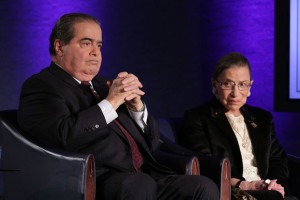
U.S. Supreme Court Justices Antonin Scalia and Ruth Bader Ginsburg
It is said that voters vote with their hearts in the primaries and with their heads in the general election. However, the death of right wing U.S. Supreme Court Justice Antonin Scalia at age 79 might cut that process short. In particular, in the Democratic primaries, Scalia’s death may focus voters’ attention on using their heads and strategy, which may be more associated with Hillary Clinton, and less on Clinton’s aspirational competitor, Bernie Sanders. Here are several reasons why:
Clinton the realist — One of the fundamental battles between Clinton and Sanders is couched as Clinton the realist versus Sanders the revolutionary. For example, Clinton contrasts herself with Sanders by saying that she is “a progressive who gets things done.” Those of us in the more realist camp often point to the U.S. Supreme Court as one of the most important real world effects of a presidency. Until now, however, this was a theoretical argument for 2016. After Scalia’s death, the Supreme Court issue is very real. The ensuing fights about President Barack Obama‘s ability to nominate and confirm a Supreme Court replacement for Scalia are sure to dominate the headlines and debates for the rest of the year, through the primaries, the party conventions and the elections in November. Indeed, Republicans are arguing that the next president, not Obama, should nominate Scalia’s replacement, which brings the Supreme Court issue front and center in the primary race for the election to succeed President Obama.
Furthermore, other Supreme Court justices are either about as old or older than Scalia (Steven Breyer is 77, Anthony Kennedy is 79, Ruth Bader Ginsburg is 82), less healthy than was Scalia (Ginsburg has had both colon and pancreatic cancer, Sonia Sotomayor has been a diabetic since childhood), or both. Many analysts agree that the next president likely will have one or more Supreme Court vacancies to fill, and few would dispute that Hillary Clinton is ready for that task on Day One. Clinton’s reality-based campaign may be more able than Sanders to focus on and discuss the new realism of replacing Scalia.
Clinton the lawyer — Hillary Clinton graduated from Yale Law School and was an attorney in private practice for a number of years. Clinton was also a law professor at the University of Arkansas, as was husband Bill Clinton. Bernie Sanders did not go to law school, nor was he an attorney or law professor. While such legal background is not required to be president, the intense focus that will be placed on the Supreme Court, legal issues, court cases, judges and the legal process may well benefit Clinton, who likely will be more comfortable and more well-versed talking about these matters. Finally, while Sanders can say that, as a U.S. Senator, he has voted on Supreme Court nominations, so has Clinton, so no advantage to Sanders there.
Clinton the Obama successor — Normally, during a two-term president’s last year in office, attention and power might be expected to ebb away from the president to the candidates vying to replace him. However, with the death of Justice Scalia, as mentioned above, the focus is back on President Obama and his fight with Republicans over the nomination of Scalia’s replacement. This was evident during President Obama’s press conference yesterday. Clinton may benefit, as she has portrayed herself as the natural successor to President Obama, and one of Obama’s fans. Clinton has also reminded voters that Obama nominated her to be his Secretary of State. Indeed, Clinton had to go through a Senate confirmation hearing process not unlike the kind a Supreme Court nominee faces. Sanders, in contrast, has a record of criticizing President Obama, even suggesting in 2011 that Obama should face a primary challenger in his 2012 re-election campaign. At a time when Scalia’s death is serving to unite the Democratic Party, Sanders is the outsider.
Clinton the First Lady — An advantage of having been the First Lady for two terms is that Hillary Clinton saw the U.S. Supreme Court nomination process up close. President Bill Clinton made two Supreme Court nominations, and was able to confirm Steven Breyer and Ruth Bader Ginsburg to the Court. Breyer and Ginsburg are two of the four dependable “liberals” on the Court. A big part of Hillary Clinton’s campaign message is that she’s a progressive who gets things done, and, in the case of a Supreme Court nomination, Clinton can state that she knows how to get this done too.
Photo by Peter Stevens, used under Creative Commons license. http://is.gd/vYpVkp


